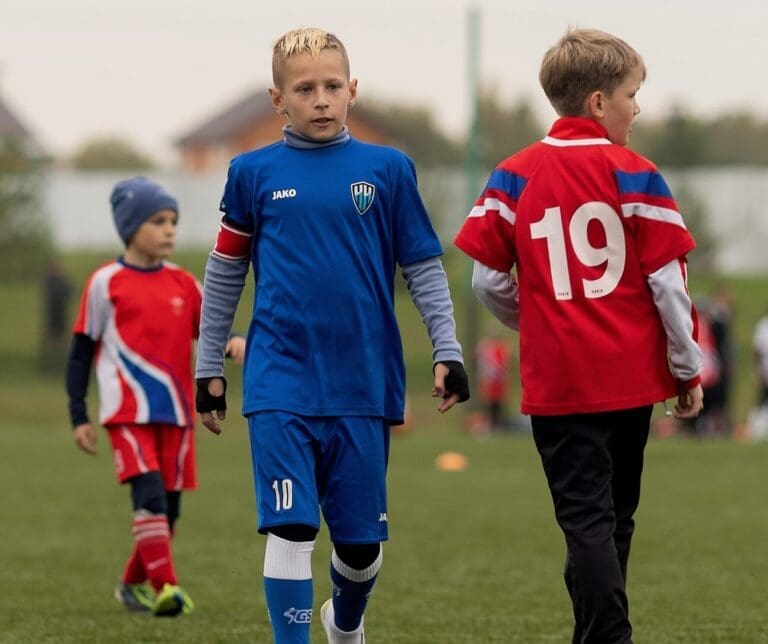
Football Psychology Tips: Why Football Can Improve The Mental Toughness Of Your Children
Being part of youth football is fraught with challenges
As a football parent do you ever take a step back and consider what practicing, training and playing football for a youngster actually does for them?
It’s so easy to get caught up on the treadmill as a parent, with working, finding 5 minutes for yourself and then playing taxi service for your kids almost every day. Then throw in the emotional rollercoaster that football parents experience when:
- Your children seem to be drifting and not enjoying their football like they used to.
- Your children aren’t getting as much game time as they’d like.
- Your children lose form.
- Your children are asked to play out of position and they find it uncomfortable.
- Your children find themselves in a toxic environment where fear is instilled, bullying is present and criticism is common.
- Your children find their coaches are biased towards other players.
Then there is the good side 😎
When:
- Your children’s team is flying and winning.
- When your children are asked to play up a level.
- When your children find man of the matches are common.
- When your children can’t sleep for excitement of playing a big game.
- When your children are bang in form and scoring lots of goals.
I’m hoping this blog, one of a three part series helps you recognise why playing football is great for them. In part one, you’ll find that I connect different experiences that they face with Professor Peter Cloughs 4C’s Mental Toughness model and then in part two and three we look at it from other angles. You’ll also find some ideas so that you can also help them stay on track, avoid distractions, and remain motivated and committed despite difficulties.
Why football can improve the mental toughness of your child?
After conducting some research when speaking to athletes, coaches and experts on the Demystifying Mental Toughness Podcast, as well as having hundreds of conversations with parents, coaches and children here are my thoughts where I share 6 of the 8 factors taken from Peter Clough’s 4C’s Mental Toughness Framework. I also highlight 6 common examples of situations that we come across on a regular basis when supporting young footballers and how you as a parent or guardian can help them.
Life Control – A CAN DO attitude
In football, the feeling of being in control can be an issue if you focus too much on other people. When you’re a talented youngster who is in and around the academy system, trials are common place. Therefore trying to please scouts, coaches and fitting in with new team-mates can be challenging. This can really test a child’s sense of “can do.” Many children start catastrophising saying to themselves, “Oh no, the standard is much better”, “I’ve no chance today he’s going to win every header” or “I’ll never get past him, he’s huge”. On having quiet games they’ll say to themselves “I was terrible today, they’ll not want me now.” And then there’s comparisonitis – “Ben and Jack (they play in the same position as your child) are much better than me.” The “can do” child is more likely to not worry and think like this and will simply enjoy the experience, taking one training session and match at a time and concentrate on giving their maximum no matter what happens.
How you can help as a parent: You could try and find out how they are feeling in specific situations. If they are fearful or worried. You could talk about imposter syndrome and what that would look like to them. For more guidance see below.
Emotional Control – Managing Difficult Emotions
Losing a match due to a poor decision, from a referee and what you perceive as a biased call can be infuriating. Often what happens is emotions then go on to take over and rule what a child does, influencing their behaviour.
Many children during a match might get angry, you’ll see them shout and end up taking their anger out in unhelpful ways such as blaming others and not taking responsibility. If coaches and parents are onboard and recognise this and aren’t caught up in the emotion of these types of situations too they are better able to help children remain calm and composed. Football is a hugely emotional game and can teach children how to adjust their responses so their mind and body remain in tune.
As a parent, if you act as a good role model and your children see you responding calmly and rationally over time they’ll have more chance of developing this behaviour than if you rant and rave on the sidelines.
Learning Orientation – Learning from Mistakes
It’s great to be competitive, football helps children with this where they get the chance to get involved in big matches and have opportunities to step up to influence winning the game. The difficulty a lot of competitive young footballers have is that they can get too focused on the score line. This can be reinforced by team-mates and coaches with conversations that take place. Parents have a big part to play too, my advice would be to avoid the obvious questions, “What was the score?” or “Did you win today?” Try to help your children love learning how they can get better every time they train or play matches. Factor into these conversations timing, look to avoid the aftermath of matches for analysing performances when emotions are running high.
Risk Orientation – Managing Expectations
Playing football gives you the opportunity to be brave if you wish to. Brave in the face of setbacks and not succeeding. For example, at the time of writing this post, Tottenham Hotspur and England striker Harry Kane has played 301 games in his Premier League career. He has taken 1118 shots, missing the target 622 times. He also failed to score 920 times from these 1118 shots. I’m sure you’d agree that is a lot of misses, yet he is one of the best around and continues to demonstrate good movement and communication being brave to give himself as many opportunities to help his team out. As a parent, managing your own and your child’s expectations in every training session and match is perhaps the most important thing you can do in this respect. To do so you can ask yourself this question. What is success today for Lucas? Answer it in this way, today I expect Lucas does ….. You can also ask your child to tell you what they think success is in the next match or training session. By doing so you’ll see where you own and their focus is and if it is helpful or not.
I sincerely hope that you found this advice useful, keep your eyes and ears peeled for more on this topic next week where we look at part 2, with more reasons why football can help children and further ideas for you to explore as parents.
You may also be interested in our Conversations with Kids emails.

Best Wishes
David Charlton
Online Sports and Football Psychologist who supports many young footballers in all corners of the globe from New York to Norwich, to Dublin to Dubai, and San Francisco to Sydney, using ONLINE Video Conferencing.
Managing Director – Inspiring Sporting Excellence
Host of Demystifying Mental Toughness Podcast
Founder of The Sports Psychology Hub
Author of Conversations with Kids
With over a decade’s experience supporting athletes, coaches, parents and teams to achieve their goals, faster.
T: +44 7734 697769






